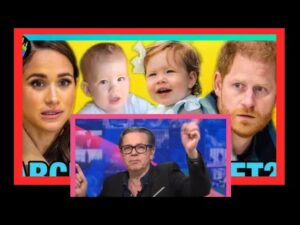In the world of media, where words carry weight, British commentator Kevin O’Sullivan has found himself in hot water after making racially charged comments about Prince Harry and Meghan Markle’s children.
Known for his sharp tongue and often controversial opinions, O’Sullivan’s latest remarks have ignited a firestorm of criticism, highlighting the darker side of public discourse.
O’Sullivan’s comments regarding Archie and Lilibet, the young royals, have been labeled as not just insensitive but outright racist.
By insinuating that these innocent children should be paraded before the media, he has crossed a line that many believe should never be breached.
This isn’t just a matter of poor judgment; it’s an exploitation of two children who are already navigating the complexities of being in the public eye.
The backlash against O’Sullivan’s statements is palpable.
Many are outraged, not only by the blatant racism but also by the casual manner in which such views are expressed.
It’s a troubling reflection of a wider issue within the media landscape—an alarming trend that allows harmful narratives to flourish unchecked.
The implications of his words extend far beyond mere controversy; they serve to perpetuate stereotypes and incite hatred.
Let’s take a closer look at what O’Sullivan actually said.
His comments, cloaked in the guise of commentary, appear to be veiled attempts at conspiracy theories targeting the young royals.
Such insinuations are more than just careless; they sow seeds of division and prejudice in society, making it all the more dangerous when they come from someone with a significant platform.
Racism isn’t solely defined by overt slurs or acts of discrimination.
It can manifest in subtler ways, such as suggesting that individuals of mixed heritage should be treated differently.
This is where O’Sullivan’s comments become particularly insidious, as they imply that Harry and Meghan’s children are somehow “other” and deserving of scrutiny based solely on their racial background.
The fallout from these comments is not just a personal issue for Harry and Meghan.
They face a barrage of scrutiny that extends to their children, who are unwitting victims of a media circus they did not choose.
As parents, the couple grapples with the challenge of shielding their kids from this negative attention while trying to provide a nurturing environment.
Archie and Lilibet deserve to grow up free from the burden of adult controversies.
The emotional impact of such public scrutiny on young children can be profound and lasting.
Innocence is a gift that should not be stripped away by the cruel machinations of adult agendas and media sensationalism.
What’s more troubling is the broader cultural context in which these comments were made.
We live in an age where information spreads rapidly, and the power of media figures can shape public opinion.
Unfortunately, some personalities exploit this power to spread hate and misinformation, raising the question: is this really the type of discourse we want to promote?
The case of Kevin O’Sullivan serves as a stark reminder of the responsibility that comes with a public platform.
It’s crucial to foster a culture of responsible journalism that respects the privacy and dignity of individuals, especially when it comes to their families.
The children of public figures should be treated with the same respect as any other child.
As consumers of media, we hold the power to demand better.
We must reject narratives that perpetuate hate and discrimination and call out those who use their platforms irresponsibly.
Change may take time, but awareness is the first step toward creating a more respectful and inclusive media landscape.
Words have immense power—they can uplift or destroy.
In the case of O’Sullivan, his words have sparked outrage and concern over the future of public discourse.
It’s time for all of us to reflect on how we engage with media and the messages we choose to amplify.
By holding public figures accountable for their statements, we can collectively work towards a culture that values empathy and understanding.
The fight against toxic narratives is not just about one individual; it’s about setting a standard for all voices in the media.
Together, we can foster a dialogue that celebrates diversity rather than demonizing it.
